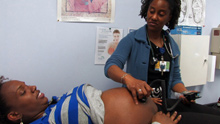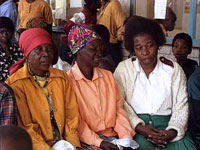Making Mothers
[00:00:25.84] Today, we are having a health fair. We're going to be having blood pressures taken. I'm going to have pregnancy tests, free HIV tests. American Lung Association is going to be here doing stuff. And there's going to be lots of children's activities.
[00:00:42.31] The other day she bit me.
[00:00:43.80] She bit you?
[00:00:44.30] Like really bit me. She was using me as a [? binky. ?] And it hurt really bad.
[00:00:50.28] Had she been doing that before?
[00:00:51.27] No. First time. [INAUDIBLE]
[00:00:52.79] She probably knows that you're trying to wean her off.
[00:00:57.13] So she punished me for it?
[00:00:58.09] Yes. That's her telling you that she's not ready.
[00:01:02.15] My name is Joan Brickhouse. I'm 23 years old. And I ended up at the Birth Center because I kept getting pregnant. I was one of the clients they never knew when to stop getting pregnant. I was popping babies out like Skittles.
[00:01:42.10] It's great. Yeah. I can hear it moving. I can feel it moving.
[00:01:48.06] I didn't always know I wanted to be a midwife. I always wanted to be in health care. 32.5 centimeters. I went to my first home birth. And then that's how I got into midwifery.
[00:02:04.88] It was a friend. A woman I met at work in the Virgin Islands. And she said, I'm having my baby at home. Do you want to come? I was kind of shocked about that. And she called me, I'm at the laundromat. I'm going to have a baby. And I went over, and she had given birth in her bath tub. And the baby came out, without a doctor, without medication, without anything. Just a midwife at her side. That was it. I was bitten.
[00:03:58.89] I'm excited. I'm very excited. It's my first child. Something I've wanted for a long time. But life, sometimes has its own plans. My own experience in coming to the DC Birthing Center has been very positive, in part because there are people who work here who look like me. This is the experience that I envisioned. This is the experience that I expected to have.
[00:04:27.28] This is a way to get the baby to burp. We most care for Medicaid patients. Most of our ladies are African American. If they have jobs, they're minimum wage, or jobs that don't really have a lot of benefits. Many are not married.
[00:04:47.42] I'm 18. I'm seven months pregnant. Miss Lisa [INAUDIBLE], Joan Brickhouse-- they don't tell you that you shouldn't have no baby at this age. Or they don't give you ultimatums on what you should do. They tell you the best thing that you can do.
[00:05:09.12] I know that it's easier for an African American woman from this neighborhood to come and sit with me, and tell me what's going on in her life. Probably easier than it is to tell somebody who doesn't look like her.
[00:05:28.66] You have a really good idea now of your baby's movement pattern. If your baby's not moving, call me. Having given birth, and now being single myself, and being a single mother of adolescent children, I have that experience to impart.
[00:05:55.97] The Birth Center is a place where we take care of women. But we also do a lot teaching. We have people who work here who were our clients first. And so I count that as one of the successes of the Birth Center.
[00:06:29.26] I feel like two weeks ago we casted six pregnant women? I think there were more. But these are the only ones I can find. I don't know what's going to be on them. It be funny sometimes what they put on them. Some of them be ugly. But I don't be telling them or nothing.
[00:06:50.67] We had a bigger belly cast that was bigger than this one time. Her boobs was all the way down here. But it was tight, though, the way she painted it. She made it like the sun, then the moon, and then she had the grass with a flower coming out of the navel.
[00:07:17.65] I can relate to the teenage mothers. Because most of the problems and things the teenage moms are going through, I already went through.
[00:07:26.84] [INAUDIBLE]
[00:07:41.51] I was one of those girls that needed a father figure in her life. And I didn't have one. So it was like I was searching for a father figure other ways. Every time, when I would try to find my father figure-- or some type of male in my life, it was like I would end up pregnant. So I never got to graduate from high school.
[00:08:14.15] The good thing about being with the Birth Center is they help you with your education while you're working. So I'm actually about to get my GED. I only have to pass the math part. Me and math don't get along.
[00:08:32.25] By me getting pregnant, I think that's one of the things that helped me to actually be in the health care. Because it's like I had to gain some responsibility to take up for another human being so I can be more secure about myself, and be able to help other people first. So it was a blessing.
[00:08:56.52] Now, we're about to play a lunchbox game. So I'm going to hold up an item. You tell me what it is, and what you think it means about breastfeeding.
[00:09:06.05] I promoted breastfeeding while I was a client. That caught one of the doula's eyes. And she called me up out of the blue, and asked me, did I want to come to a training for breastfeeding parent counseling? How big is your baby's stomach? As big as their fist is, that's how big their stomach is.
[00:09:22.32] I educate men, women, and children about the importance of breastfeeding. They don't have it down pat. They don't know what they're doing. And then I just step in and help them. Sometimes they just need a person right there, some support. Then once you're right there in the room with them, they automatically pick it up, just like that.
[00:09:43.01] So, is my baby successfully latched?
[00:09:45.90] Not necessarily.
[00:09:47.26] Why do you say that?
[00:09:48.29] [DRUMMING]
[00:10:13.82] I'm actually terrified out of my mind of the labor. But millions of women have kids. So I'm just going to be a part of that group. I have a lot of support from my boyfriend. My mom will be coming in town. The midwives at the Birth Center are awesome. So I know everybody's going to be working together.
[00:10:46.29] They allowed me to take part. And when they're checking her out, I play doctor.
[00:10:51.76] [INAUDIBLE]
[00:10:58.86] We're going to do a water delivery in the tub. Right?
[00:11:03.56] Mm-hmm. We'll see. You know how it goes.
[00:11:07.60] That's still the plan.
[00:11:08.30] You don't know how it goes. That's still the plan.
[00:11:11.16] Well, OK, that's the plan. That's the plan. If it works out, we're going to deliver in the tub.
[00:11:17.08] And I'm supposed to catch the baby too. So it's going to be interesting.
[00:11:31.16] We are here now awaiting the baby. We came back to the hospital about three times yesterday. And each time--
[00:11:40.76] [INAUDIBLE]
[00:11:44.13] I mean the Birthing Center.
[00:11:44.80] OK, the Birthing Center. You haven't once been to the hospital.
[00:11:51.11] I switched the names, but--
[00:11:54.65] Women love giving birth here. You're here, surrounded by your family. There's a midwife here with you around the clock, from the moment you arrive, until you go home. Second to giving birth at home, it's the best way to give birth.
[00:12:13.46] [MOANING]
[00:12:37.59] Wow, that's loud. [INAUDIBLE] Progressing normally. This is a first time labor, so they take long. Her water broke yesterday. So if she was not in good established labor by 24, 48 hours after her water broke, we would offer a hospital induction.
[00:13:13.48] There we go.
[00:13:22.90] [MOANING]
[00:13:41.09] My favorite part about being a midwife is helping to create the peaceful, wonderful atmosphere for birth that I had myself. OK, and tell me what his name means again.
[00:13:58.65] Positive thoughts.
[00:14:00.13] Positive thoughts. And that's what we need right now. All we have left is an anterior lip. Just a small piece the cervix in the front of the baby's head.
[00:14:16.65] One, two, three.
[00:14:29.15] [MOANING]
[00:15:05.93] This is mom's anatomy. This part of the cervix is still present like this much. And the baby's head is more down on the backside, which is no cervix at all. On the front side, there's cervix. And basically, at this time, that should be gone. Basically, that should be completely done. That should be fully dilated by now.
[00:15:36.00] I have been in labor for so long, I just want to have the baby. We can go in the corner. And I'll have it in the corner, and be happy.
[00:15:51.69] So, tell me what you're thinking. OK. It's just important to-- we've been here--
[00:16:04.25] 41 hours.
[00:16:04.67] An awfully long time.
[00:16:06.53] Well, no. Not 41 hours. I've been in labor for 41 hours.
[00:16:09.68] No, we've been here a long time. OK.
[00:16:12.65] Hi, Tonya. This is Helen calling from the Birth Center. I just wanted to give you a heads up that we're transferring in a patient from the Birth Center who is-- OK. Well, she's nine centimeters, and she's been that way for awhile. So she's coming in for augmentation.
[00:16:31.39] [MOANING]
[00:16:48.19] [INTERPOSING VOICES]
[00:16:54.11] It is Helen's first call day. So we switched-- it's better, especially since they're going to the hospital, to have Helen, who's fresh and ready to go.
[00:17:10.95] This is so crazy. Because I never would have imagined I'm sitting here talking to you all nine and a half centimeters dilated.
[00:17:16.25] The important thing is to get the baby out safe. And it's taking longer than normal. And I was concerned, because it seemed that the baby had gotten into a position that was going to make it difficult to get out. So I just wanted to make sure that they're at a place where, if they need some other assistance, they can get it. And this way, they leave, and it's not an emergency.
[00:17:56.41] It happens.
[00:17:56.89] You did a great job.
[00:18:00.29] Well-- She did a great though. She did good.
[00:18:37.26] [INAUDIBLE]
[00:18:52.01] I work here because I love to work here. Offering this birth experience is-- I feel privileged to be a part of that.
[00:19:04.26] Good answer. Yay! I never thought I was going to be in the health care profession at all. But, I actually get to do stuff for people that people did for me. It's like I get to be on the other side of the fence, seeing all of the good things. It actually feels good though.




